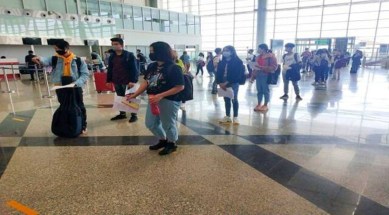Stay updated with the latest - Click here to follow us on Instagram
Canadian body to work for immigration fraud prevention
The Immigration, Refugees, Citizenship Canada (IRCC) held a special presentation on "Fraud Prevention" at the Consulate General of Canada in Chandigarh on Thursday.

In response to the recent fake college admission letter scam that has put a question mark on the future of hundreds of Indian students in Canada, the Immigration, Refugees, Citizenship Canada (IRCC) held a special presentation on “Fraud Prevention” at the Consulate General of Canada here on Thursday.
The event aimed to shed light on various aspects of immigration, and provide guidance on ways to avoid fraudulent practices while trying to obtain permanent residence (PR) in Canada.
monthly limit of free stories.
with an Express account.
The presentation was attended by Patrick Hebert, the Consul General of Canada, Bruce Grundison, South Asia Area Director of IRCC, and Naresh Sharma, the Migration Program Manager (MPM). They gave valuable insights and advice on safeguarding oneself against potential fraud in the immigration process.
During the session, it was acknowledged by a Canadian consultant that due to the overwhelming number of Indian students, particularly from Punjab, seeking to study in Canada, it is difficult to conduct face-to-face interviews with each applicant. Consequently, Canadian authorities have authorised certain organisations to handle the initial screening process on their behalf.
Recognising Chandigarh as a key hub for students from the northern region, especially Punjab, the decision to hold the presentation in Chandigarh was made. A participant, who has made frequent visits to Canada, emphasised that while Canadian universities are excellent, the standards of some colleges may not be on a par.
In a question-and-answer session, this individual, associated with a local private educational institute, cited an example of a college in Canada where all the students were immigrants from South Asian countries, with no Canadian students enrolled. The issue of students from Punjab joining IELTS institutes in southern India was also discussed during the presentation.
Responding to a query about the verification process for applications prepared by agents, an IRCC officer stated that the responsibility lies with the prospective client and the agent. IRCC does not become involved in the pre-application stage. However, it is crucial for the applicant to ensure that all the information provided in the application is authentic before submitting it to IRCC.
The consultant officer said that IRCC Chandigarh will continue to conduct in-person seminars at educational institutions in the coming months. These sessions will focus on fraud prevention, but they will not provide assistance or information on choosing a course, as that decision has to be taken by the individual student based on his or her career aspirations.